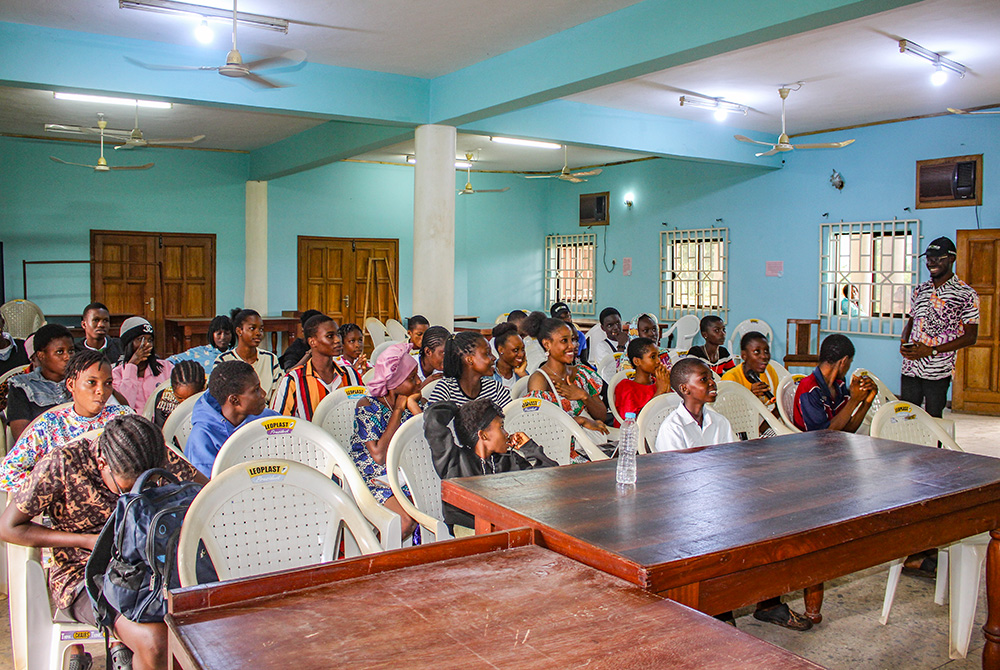
Students of the 3M ICT Hub during their final project presentation in July. The digital training center in Benin City, Nigeria, is run by the Medical Missionaries of Mary. (GSR photo/Valentine Benjamin)
When Michael Nwani enrolled at the 3M ICT Hub, a digital training center run by the Medical Missionaries of Mary in May this year, he had one thing on his mind despite studying physiotherapy at the University of Benin — to become a web developer.
His interest in the program grew after the sisters announced it at his local church, Miraculous Infant Jesus Catholic Church, after Mass in April. He immediately enrolled the next day for web design training, one of the courses offered at the 3M ICT Hub, where he was introduced to Microsoft Office applications like Word, Excel and PowerPoint.
Nwani struggled between academics and his web design program for a few weeks before settling for online classes, which he says was difficult. He said the requirement of an internet connection "was exhausting, especially with the level of fluctuating broadband connection we have presently."
The program was an opportunity for him to learn how to create websites with multiple pages using the JavaScript programming language, CSS for attractive layouts, and HTML to structure a web page.
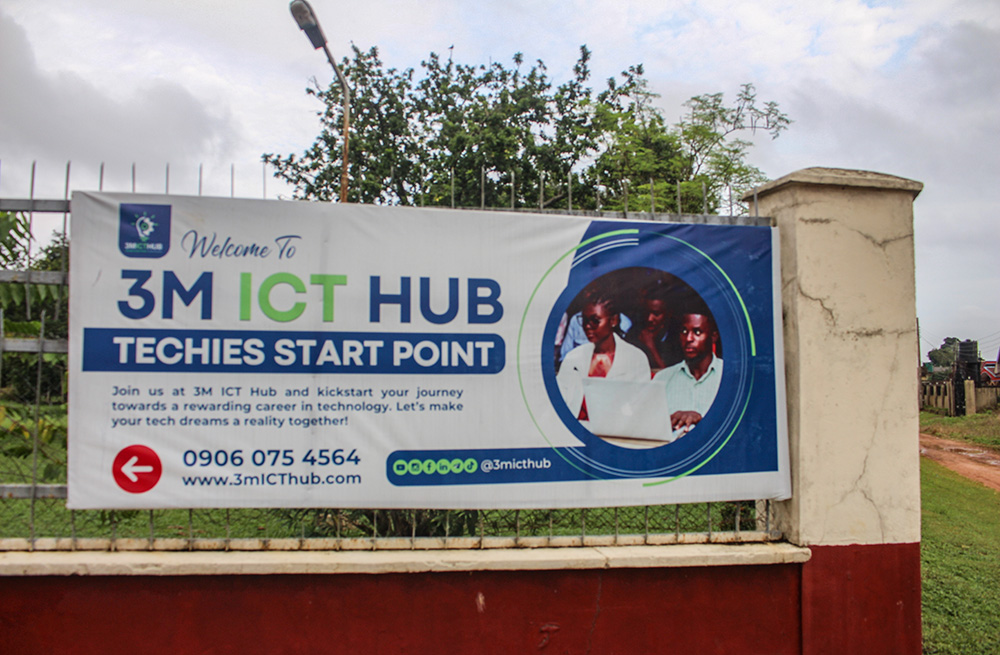
A sign in front of the Medical Missionaries of Mary Convent in Benin City, Nigeria, informs the public about the 3M ICT Hub where young Nigerians learn digital skills. (GSR photo/Valentine Benjamin)
"I am almost done with the front end and will be able to start and finish the design of a webpage when I finish with the backend tutorial," Nwani said.
He said he had always wanted to learn web development outside of academics. The sisters-run digital hub offered him the opportunity to realize his dreams.
Nigeria, Africa's most populous nation, has a robust youth population. According to UNICEF, only 7% of this population has information and communications technology (ICT) skills.
High poverty rates, food insecurity, widespread unemployment and insecurity threaten the overall quality of life for the population. About 12% of the world's population in extreme poverty lives in Nigeria, leading many of the unemployed population into cybercrime and other related crimes. The Economic and Financial Crimes Commission has said that more than 70% of Nigerian youths could become ex-convicts if their involvement in cybercrime is not addressed.
"This is one of the reasons why we launched the 3M ICT Hub, formerly known as Mother Mary Martin Computer Training Center," said Sr. Patience Nwambeke, coordinator of the center.
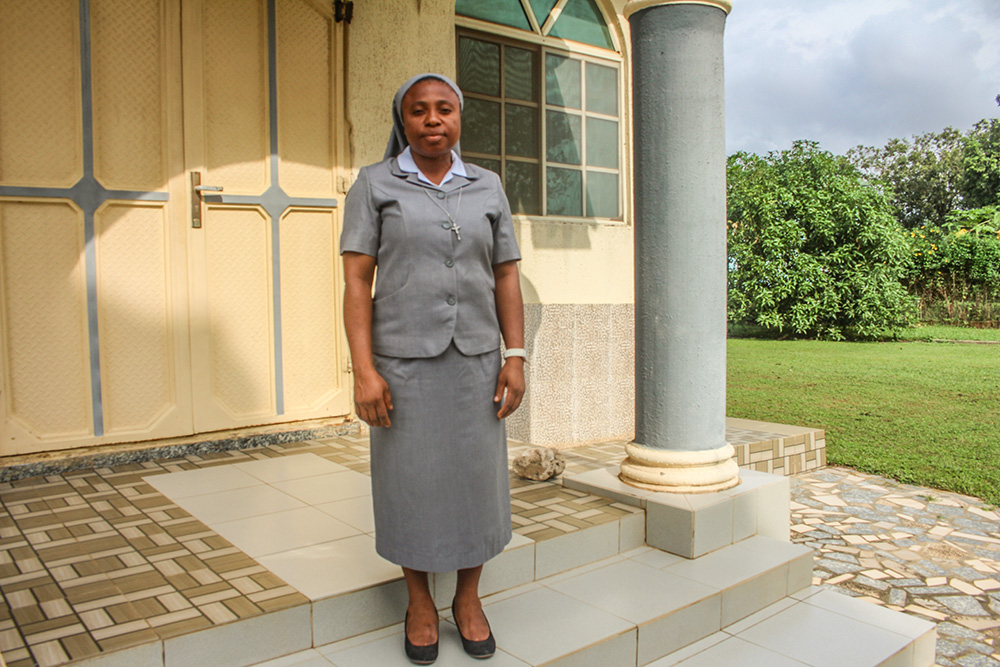
Sr. Patience Nwambeke, coordinator of the 3M ICT Center in Benin City, Nigeria (GSR photo/Valentine Benjamin)
"We realized the need for them to know digital skills because we are in the era of artificial intelligence. This will go a long way in creating employment opportunities, improving quality of life, bridging the digital divide, and putting them on the same pace as the trends in the world evolve," she told Global Sisters Report.
The sisters-run 3M ICT Hub is a tech community in the Ugbekun area of Upper Sakponba, a suburb of the Benin City metropolis. It is equipped to facilitate training on digital skills and vocational training in basic information and communications technology.
The center is powered by solar energy, with a 24-hour consistent power supply, wireless connectivity, and a training hall equipped with computer systems and a conducive learning environment.
The center was founded in 2006 by Sr. Blandina Ryan, one of the pioneer sisters of the Medical Missionaries of Mary who helped to counter human trafficking in Benin — the epicenter of human trafficking in Nigeria.
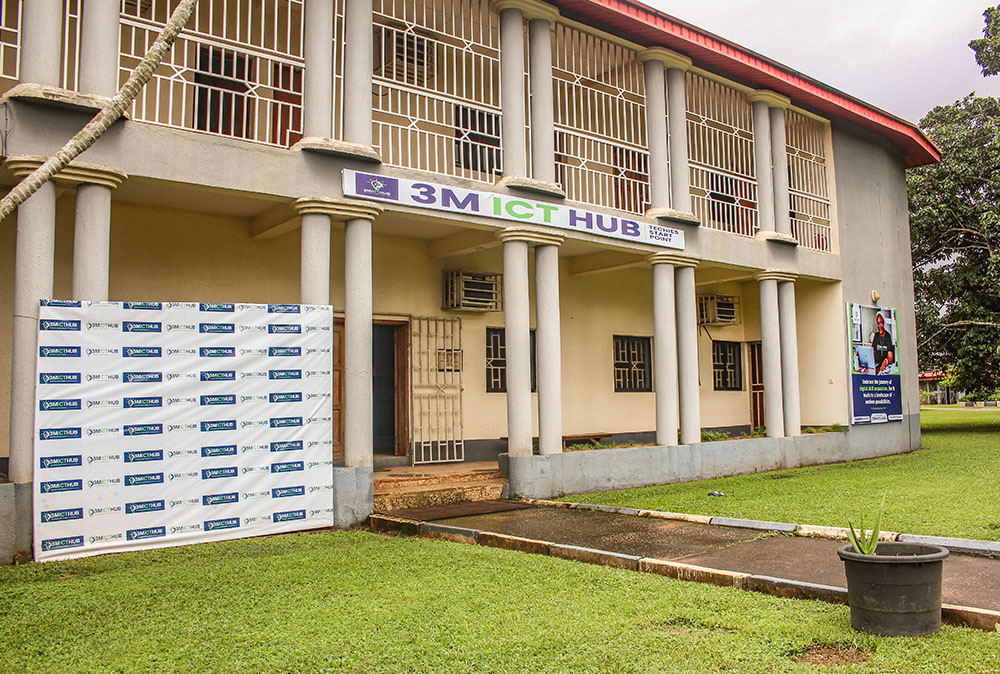
A building housing the 3M ICT Hub, a digital training center where young Nigerians learn digital skills. The center is run by the Medical Missionaries of Mary. (GSR photo/Valentine Benjamin)
Nwambeke said the center was initially established to curb trafficking and other related crimes among youths in Ugbekun and empower them in catering and fashion design. However, many centers also offered these services, so they focused on information and communications technology.
"We used to have graduation ceremonies twice a year until COVID-19 disrupted our operations in 2020. We had to close for a while, and now we have reopened massively with a larger audience and more ICT departments to meet the needs of the people," she said.
Ezekiel Elom, front-end instructor at the 3M ICT Hub, said the center is a starting point for young Nigerians seeking to acquire knowledge in digital technology. They also offer printing services, photocopying, typing and flex banner designing to individuals and companies.
In April this year, 50 students enrolled in the program, which opened with a free three-month digital skills boot camp. A full scholarship was offered to the best five students, and a 30% discount was given to 20 students who could not afford the tuition fee of 30,000 naira (US$20).
Advertisement
Forty students graduated and advanced into the labor market, while the remaining seven students were scheduled to return to defend their projects.
Nwani told GSR that the training has prepared him for the journey ahead.
"I am confident I can replicate the knowledge I have acquired here in the work market. I have always wanted a part-time job that would earn me money even though I am still in school. This will reduce my dependence on my parents," he said.
Blessing Udeh, who joined the program in April when the free digital skills boot camp opened, said the training was theoretical and practical.
She said her training was challenging, but she was able to overcome it with the help of her tutors. "I learned how design principles, elements and processes can achieve an appealing and informative advert. I can design banners, flyers, book covers and magazine covers. So far, I'm proud of myself."
Udeh is saving money to buy a laptop to facilitate her graphic design knowledge. "I've made that solemn promise to myself because I don't want my knowledge to go to waste," she said.
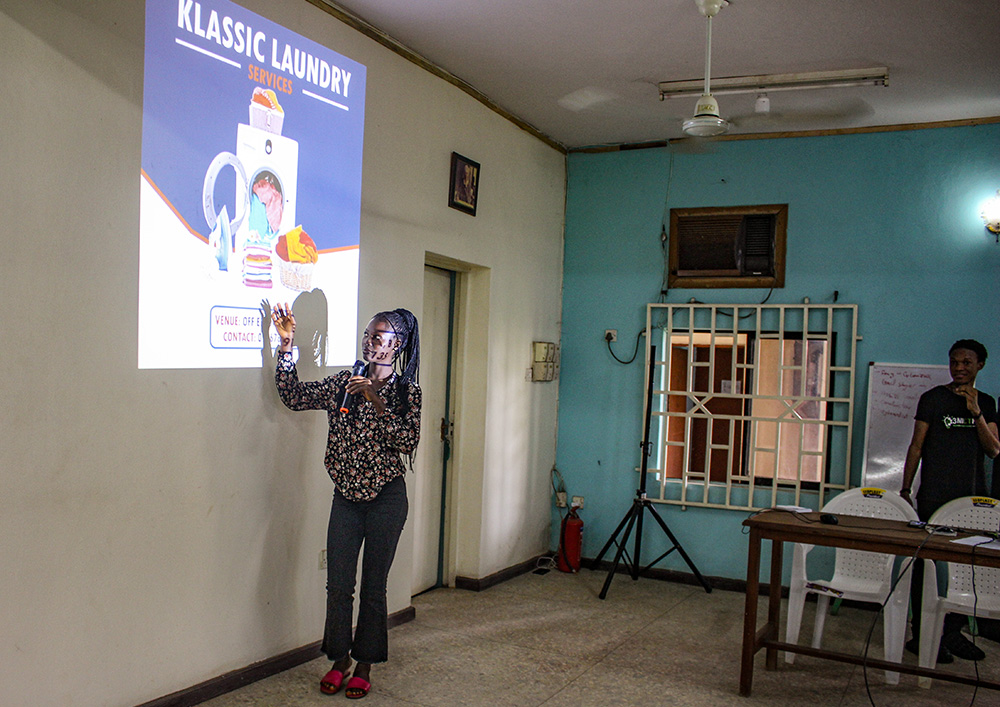
Blessing Udeh displays her Klassic Laundry ad banner design during her project presentation and defense in July. She was among the many students who joined the program in April when the free digital skill boot camp opened. (GSR photo/Valentine Benjamin)
Nwambeke works with four facilitators who serve as instructors for the program. The 3M ICT Hub collaborates with LAskill Training Center, which provides digital skills training for individuals and organizations in Akwa Ibom, Nigeria.
Additionally, the 3M ICT Hub partners with the Sisters-Led Youth Empowerment Initiative managed by the Nigeria Conference of Women Religious to offer entrepreneurial skills and social enterprise tools, support young people and address unemployment challenges.
The group has trained more than 150 students on basic information and communications technology skills, web development, digital marketing and graphic design free of charge. The training is practice-based; each student makes a final project and is certified at the end of the training.
Its greatest challenge is the unavailability of funds to manage the project and pay staff, as it survives on student fees. There are also limited computers for students.
The 3M ICT Hub is currently projecting future collaborations with other innovation hubs to facilitate internship opportunities for their students after graduation.
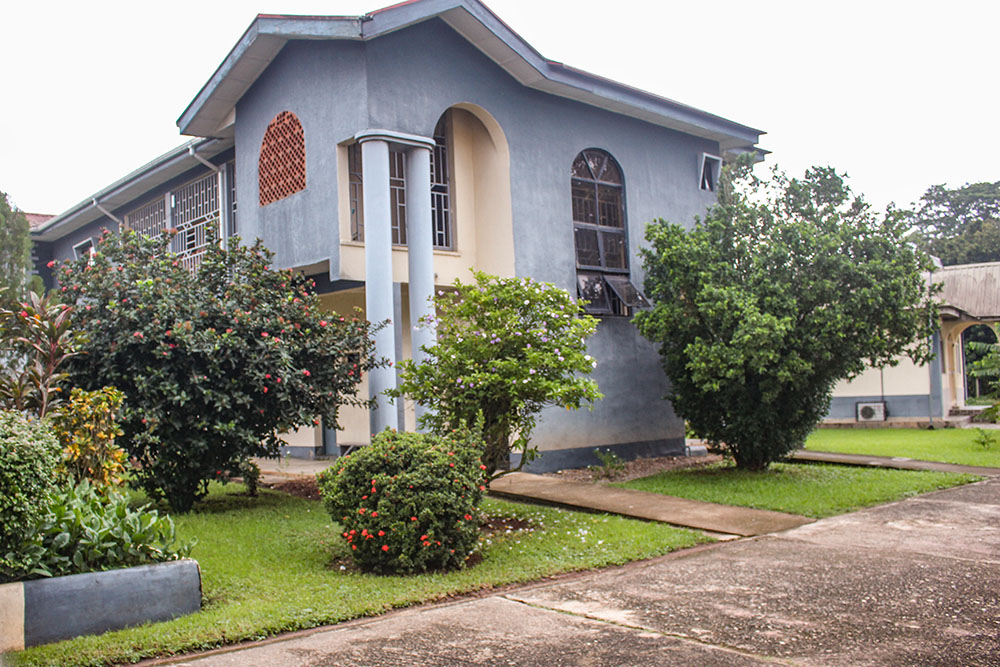
The Medical Missionaries of Mary Convent in Benin City, Nigeria (GSR photo/Valentine Benjamin)
In the next three years, Nwambeke wants to expand access to technology and enhance digital literacy by developing and implementing comprehensive digital literacy programs for all groups, focusing on basic to advanced tech skills through partnerships with schools and community organizations to offer workshop courses.
Another goal is to secure funding and sponsorships and provide accredited training programs in software development, cybersecurity, data analysis and digital marketing.
Nwambeke also wants to support entrepreneurship and innovation by establishing incubator programs for innovative tech startups, providing resources, mentorship and networking opportunities.
She told GSR that she plans to host hackathons and innovation challenges to encourage problem-solving and new business ideas through collaborations with tech companies, educational institutions, and government agencies to expand resources and opportunities.
Nwambeke explained, "This will enable us to build a tech community of individuals building solutions to products, learning and monetizing their skills, and expand across various parts of the country."





